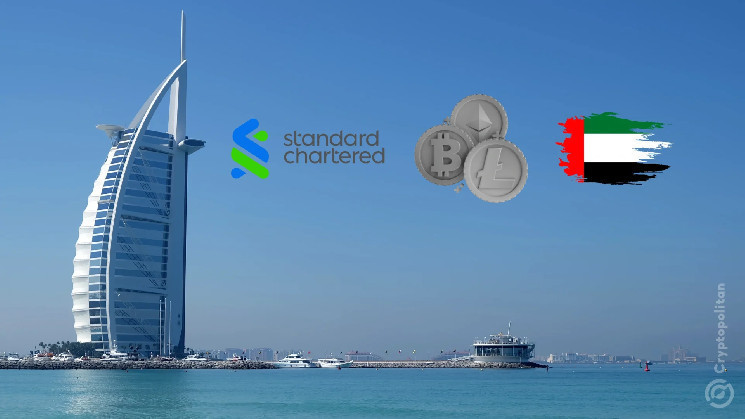Global bank Standard Chartered launched its digital asset custody service in the United Arab Emirates (UAE). The service has been licensed by the Dubai Financial Services Authority (DFSA) within the Dubai International Financial Centre (DIFC).
The service licensure follows a memorandum of understanding signed in May 2023. According to the financial institution, the initial focus will be on Bitcoin and Ethereum coins.
Standard Chartered wants to meet the rising demand in the UAE
Standard Chartered’s decision to offer this service in the UAE reflects the country’s rounded approach towards accepting digital assets. Brevan Howard Digital, the crypto division of Brevan Howard, an investment management platform specializing in global macro and digital assets, has been named as the first client.
Bill Winters, Standard Chartered’s Group Chief Executive, commented on the development, noting that the launch of the digital asset custody offering represents a pivotal moment for Standard Chartered and the financial services industry.
Winters also added that the bank firmly believes that digital assets are not merely a passing trend but a fundamental shift in the fabric of finance.
Margaret Harwood-Jones, Global Head of Financing & Securities Services also said:
This announcement demonstrates the growing institutional interest in digital assets and the critical need for secure, regulated custody solutions. The service aims to address the regulatory, risk, and security needs of institutions.
Margaret Harwood-Jones
UAE growing as a crypto hub with robust regulations
The United Arab Emirates has become a key hub for cryptocurrency due to its supportive regulations and active initiatives to promote the digital asset industry. The UAE emphasizes merging innovation with Anti-Money Laundering (AML) and Know-Your-Customer (KYC) rules to attract institutional investors and businesses in regions like Abu Dhabi and Dubai.
The use of cryptocurrency among the populace is not widespread yet, at 10%. However, crypto usage in the UAE is steadily increasing in popularity, with a 51 % growth in daily cryptocurrency traders compared to last year.
Abu Dhabi and Dubai have established themselves as key players in regulating digital assets by creating strong frameworks through the Dubai International Financial Centre (DIFC ) and Abu Dhabi Global Market (ADGM). These regulatory developments have attracted players within the industry, such as Paxos and eToro.
The United Arab Emirates has been making strides in improving its regulations against money laundering , which resulted in its removal from the Financial Action Task Force (FATF) grey list in April 2024. This development has solidified the country’s appeal as a prime hub for digital assets.
The country’s clear regulatory framework and accommodating attitude towards investors are projected to uphold the growth of its cryptocurrency sector.
 cryptopolitan.com
cryptopolitan.com
